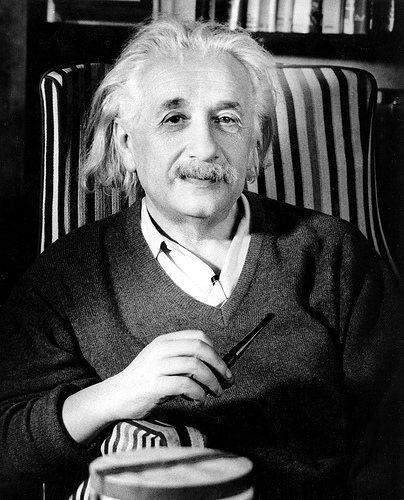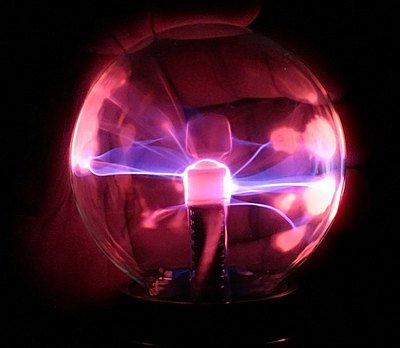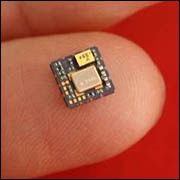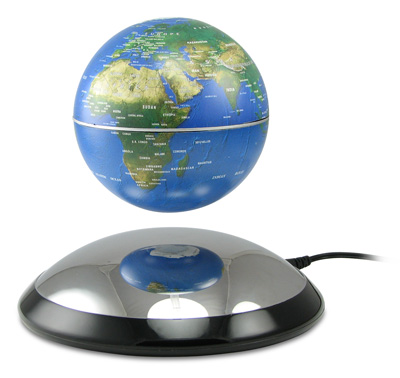|
|
|




Albert
Einstein (pronounced /?Šlb?rt ?a?nsta?n/; German: [?alb?t ?a??n?ta??n];
14 March 1879–18 April 1955) was a theoretical physicist. His many
contributions to physics include the special and general theories of
relativity, the founding of relativistic cosmology, the first
post-Newtonian expansion, explaining the perihelion advance of Mercury,
prediction of the deflection of light by gravity and gravitational
lensing, the first fluctuation dissipation theorem which explained the
Brownian movement of molecules, the photon theory and wave-particle
duality, the quantum theory of atomic motion in solids, the zero-point
energy concept, the semiclassical version of the Schr÷dinger equation,
and the quantum theory of a monatomic gas which predicted Bose-Einstein
condensation. Einstein
is best known for his theories of special relativity and general
relativity. He received the 1921 Nobel Prize in Physics “for his
services to Theoretical Physics, and especially for his discovery of
the law of the photoelectric effect.” Einstein
published more than 300 scientific and over 150 non-scientific works.
He is often regarded as the father of modern physics. |

In
physics and chemistry, plasma is a partially ionized gas, in which a
certain proportion of electrons are free rather than being bound to an
atom or molecule. The ability of the positive and negative charges to
move somewhat independently makes the plasma electrically conductive so
that it responds strongly to electromagnetic fields. Plasma therefore
has properties quite unlike those of solids, liquids, or gases and is
considered to be a distinct state of matter. Plasma typically takes the
form of neutral gas-like clouds, as seen, for example, in the case of
stars. Like gas, plasma does not have a definite shape or a definite
volume unless enclosed in a container; unlike gas, in the influence of
a magnetic field, it may form structures such as filaments, beams and
double layers. |

Science
(from the Latin scientia, meaning "knowledge") is in its broadest sense
to any systematic knowledge-base or prescriptive practice that is
capable of resulting in a prediction or predictable type of outcome. In
this sense, science may refer to a highly skilled technique or practice. |

The
Global Positioning System (GPS) is a U.S. space-based global navigation
satellite system. It provides reliable positioning, navigation, and
timing services to worldwide users on a continuous basis in all
weather, day and night, anywhere on or near the Earth. GPS
is made up of three parts: between 24 and 32 satellites orbiting the
Earth, four control and monitoring stations on Earth, and the GPS
receivers owned by users. GPS satellites broadcast signals from space
that are used by GPS receivers to provide three-dimensional location
(latitude, longitude, and altitude) plus the time. |

In
its more restricted contemporary sense, science is a system of
acquiring knowledge based on scientific method, and to the organized
body of knowledge gained through such research. This article focuses on
the more restricted use of the word. Science as discussed in this
article is sometimes called experimental science to differentiate it
from applied science, which is the application of scientific research
to specific human needs—although the two are commonly interconnected. |

Science
is a continuing effort to discover and increase human knowledge and
understanding through disciplined research. Using controlled methods,
scientists collect observable evidence of natural or social phenomena,
record measurable data relating to the observations, and analyze this
information to construct theoretical explanations of how things work.
The methods of scientific research include the generation of hypotheses
about how phenomena work, and experimentation that tests these
hypotheses under controlled conditions. Scientists are also expected to
publish their information so other scientists can do similar
experiments to double-check their conclusions. The results of this
process enable better understanding of past events, and better ability
to predict future events of the same kind as those that have been
tested. |

In
physical cosmology, astronomy and celestial mechanics, anti-gravity is
the idea of creating a place or object that is free from the force of
gravity. It does not refer to the lack of weight (but not the lack of
gravity) experienced in free fall or orbit, nor to balancing the force
of gravity with some other force, such as electromagnetism. Instead,
anti-gravity requires that the fundamental causes of the force of
gravity be made either not present or not applicable to the place or
object through some kind of technological intervention. Anti-gravity is
a recurring concept in science fiction, particularly in the context of
spacecraft propulsion. The concept was first introduced formally as
"Cavorite" in H. G. Wells' The First Men in the Moon, and has been a
favorite item of imaginary technology since that day. |

